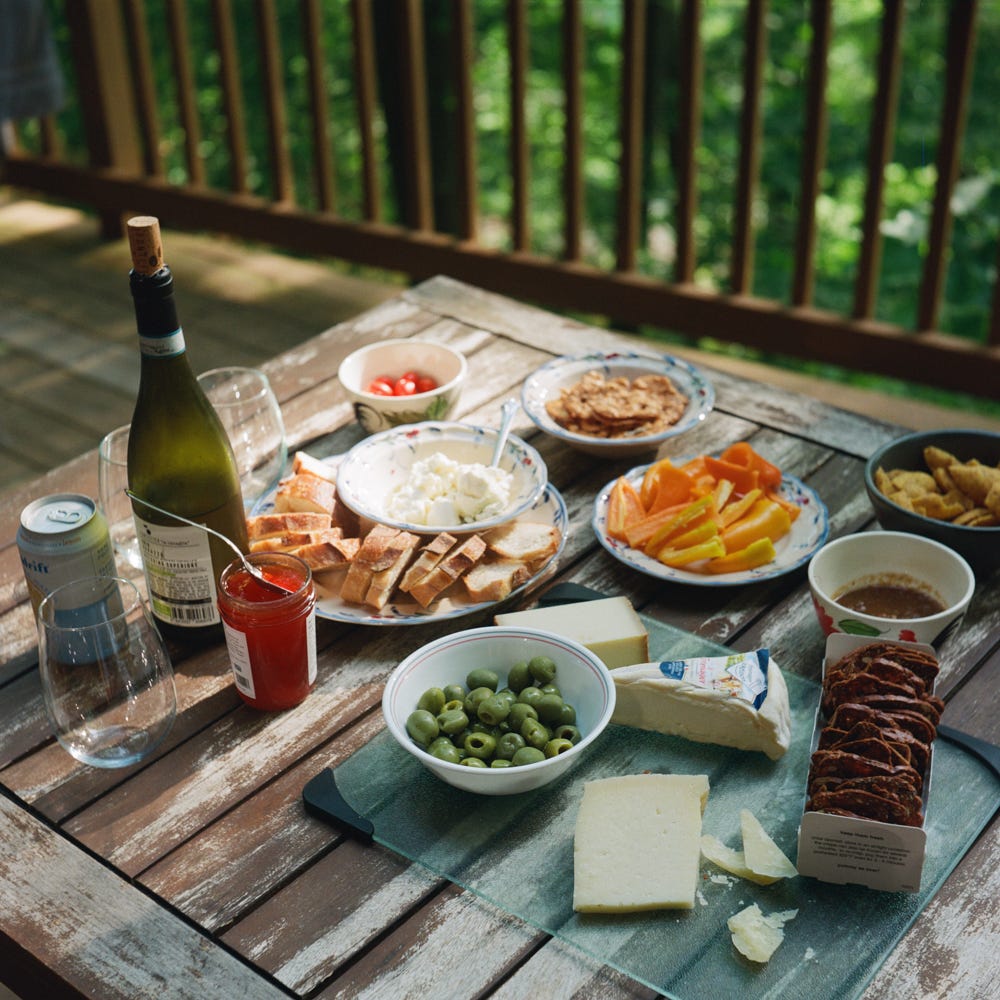Cooking as connection
I reclaimed the joy of cooking with the help of a small sous-chef.
A True Life Built is a living photo essay on starting over and building a truer life. It’s for anyone, at any age, who is finding the courage to begin again. Subscribe for free weekly posts.
If you ask friends to describe me, nearly everyone would call me a cook.
For 17 years, I made dinner for my husband almost every night. I made grilled pizzas and miso salmon and served warm pies at the end of dinner parties. I made sesame noodles in summer and luxurious roasts in winter and banana bread when I needed a hug. I could—and often did—grill a feast for 30 friends on three hours’ notice.
I cooked because I enjoyed it and also because it was expected, part of my unquestioned role in keeping a home. I fed my family and friends, like my mother and grandmother before me, because that’s what wives did. But when my marriage died, my will to cook died with it. Once I had shattered my home, and the person I built that home with, what was the point of cooking anymore?
I had poured myself into caring for others but now I struggled to care for myself.
In the early days of divorce, I lived on bread and cheese. Night after night I sat on the couch, crying into my quesadilla.
I had always thought of sadness as a mental state, one you could think your way through. I didn’t know yet that grief goes off like a bomb in your body, fracturing your brain and upending familiar patterns of eating and sleeping. Doing simple tasks felt like swimming through wet sand.
In Notes on Grief, a slim and searing book on losing her father, Chimamanda Ngozi Adichie writes:
“Grief is not gauzy; it is substantial, oppressive, a thing opaque… the pain is not surprising, but the physicality is.”
“Ah!” I thought, “this is what’s happening to me!” I took comfort in the recognition. Still, my fridge sat empty. I lost 15 pounds between one doctor’s visit and the next.
“Liz,” my therapist said, “you’re not allowed to disappear on me.”
I knew she was right—but I simply could not bring myself to cook.
Outside on my back deck stood a massive grill that had once been the star of sprawling dinner parties. I shoved it into a corner where it started at me reproachfully, a 289-pound block of guilt.
“You have no one to cook for,” it muttered from its corner.
“Shut up grill,” I said.
My first summer single, I fired it up exactly once. I grilled chicken and veggies and posted a triumphant photo about cooking for myself. But it was no use; there was no going back to the way things were. I deleted the photo and then broke down and wept.
I never touched the grill again.
My second summer single, I got rid of the damn grill. After a two-year standoff, purging the grill took exactly 24 hours, two strong men, and a post on my neighborhood Buy Nothing group. Once the surly hunk of steel was gone, my deck felt lighter.
A few weeks later, I joined my family for a vacation in France. We rented a house in a tiny town with a cobblestone square and narrow streets strung with wisteria.
I had a glorious chef’s kitchen and nothing to do but wander the markets and dream up that night’s meal. At last, people to feed! I bought whatever delighted me: strawberries and rhubarb and figs, fresh chickens and charcuterie, garlicky olives and soft cheeses and our daily baguette.
My nine-year-old cousin, who followed me around like a shadow, promptly declared herself my sous-chef. Together we roasted the chickens with butter and handfuls of rosemary and sage that grew outside the kitchen door. She chopped the figs for the sauce and the radishes for the salad and meticulously washed each lettuce leaf.
Yes, it felt good to cook for people again. But as my small cousin and I worked together in a quiet rhythm, I also remembered something older: cooking as an act of connection, a benediction passed down through generations.
I remembered helping my own mother at her age, sitting on the kitchen counter as we baked bread. I remembered the smell of yeast and the delight of popping the bubbles in the warm dough. I remembered feeling at peace in the kitchen and the joy that multiplies when you’re sharing something joyful.
There was a difference, I realized, in cooking for someone and cooking with them. In the easy communion with my niece, cooking once again became an act of nourishment. I was cooking, not out of duty, but out of love.
One of the unexpected joys of starting over has been hearing from others on similar journeys. If something resonates with you, I’d love for you to leave a comment, drop me an email or share a post with a friend!
Liz is a writer and photographer based in Brooklyn. She’s spent her career finding the right words for others and now she’s finding her own.





Liz.. so. damn. good. Wow. You're not just writing and taking a risk. You're writing with total power <-- needs to be in bold. I loved the way you took us through the growth. The food. The places.
Goodbye, grill. Hello, Writer/Chef Liz.
I'm crying again, now at a noodles & noodles. These move me so much, I think because I KNOW you deeply. While I miss those Sunday night meals, I don't miss you sulking away into the night.